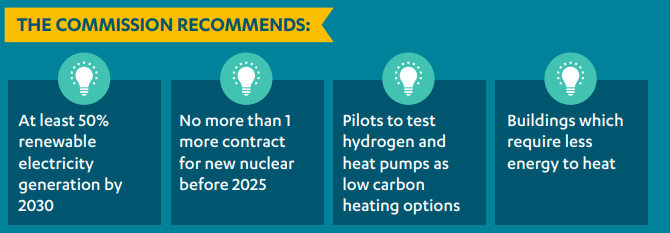Low-carbon transition is also low-cost, says infrastructure body
An independent body in the UK has urged the government to speed up the transition to a low-carbon economy.

An independent body in the UK has urged the government to speed up the transition to a low-carbon economy.
The National Infrastructure Commission, set up in 2015, has released its first assessment into the UK’s infrastructure needs over the next generation.
The report emphasises the “golden opportunity” that low-carbon technologies present in providing clean energy which can meet the UK’s climate ambitions without breaking the bank.
Investing now in renewable and low-carbon technologies across the whole heating, transport and power sectors can have significant cost benefits in the future, the commission argues. Its analysis shows that if these energy-saving investments are made sooner rather than later, the average UK household could be paying the same for all their energy needs in 2050 as they do now.
However, this requires more ambition and long-term thinking from the government, including new financial support to increase the amount of electricity from renewables to a minimum of 50 percent by 2030. More needs to be done to tackle the underperforming energy-saving sector and massively scale-up the number of new electric vehicles as well.
£3.8 billion should be spent on improving the energy efficiency of social housing and tighter regulations on the energy efficiency of rented properties. The government should also be targeting energy-saving upgrades in 21,000 households a week by 2020.
Chairman of the National Infrastructure Commission Sir John Armitt said: “If we act now we have a golden opportunity to make our country greener, and protect the money in the pockets of consumers long into the future – something few of us expected to be able to do.
The report closely follows a similar call from the government’s own climate advisers a fortnight ago. The Committee on Climate Change warned that not enough is being done to address emissions reduction across the whole economy.
“Ministers can seize this chance by investing in renewables and other low-carbon technologies so they become the main players in our energy system – something that was considered a pipedream as little as a decade ago. But they need to act now to realise the full potential of what can be achieved.”
Trade body RenewableUK responded to the report by calling for an end to the de facto ban on new onshore wind projects. Executive Director Emma Pinchbeck commented: “Cheap renewables offer the best deal for consumers. Government has a great opportunity to give bill payers a break by putting renewable energy at the heart of a modern smart energy system. Instead of that it’s inexplicably blocking new onshore wind projects. Why?”
Source: NIC







_400_250_80_s_c1.jpg)